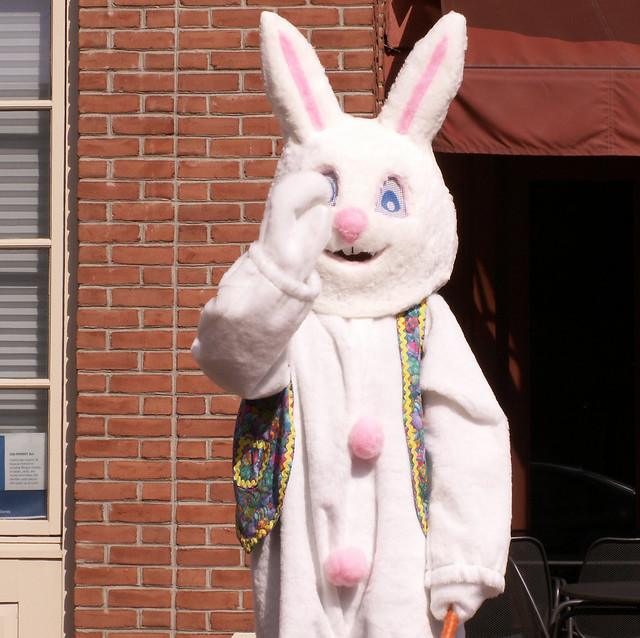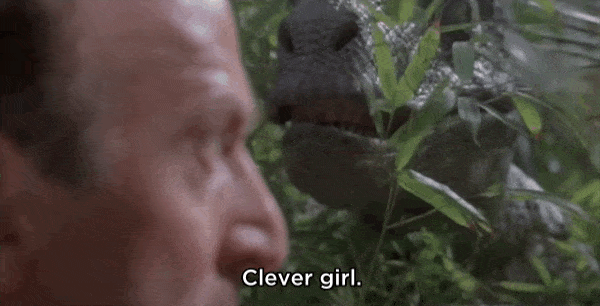I wrote this essay originally in December of 2019; though I’ve edited it to some extent, I’ve also left in the 2019-ness of it. That said, in many ways, my points about fascism and queerness are truer today in 2022 than they were two years ago. We are watching in real time as terfs collide and join with the alt-right, the fascist ideologies of these groups apparently being sufficient to unite folks traditionally divided by an idea of feminism. Jojo Rabbit, then, is art that transcends its time and lends us opportunities for radical hope. Anyway, here you go.
Oh, and here there be spoilers! I utterly reveal the plot of this movie.
Taika Waititi’s (2019) film Jojo Rabbit is a film about what it’s like to live under fascism and Nazis, set in World War II Germany; of course, in 2019 a film about Nazi Germany is also, of course, a film about fascism and Nazis in the United States. I had read about all of this setting and about Waititi’s portrayal of Hitler before seeing the movie, so none of this was news to me. What I found unexpectedly joyous about the film is this: it’s so fucking queer.
By queer I do not mean the way in which the movie offers LBGTQ+ representation; Captain Klenzendorf (portrayed by Sam Rockwell) and his second-in-command Finkel (played by Alfie Allen) are queer, and it’s great, but representation doesn’t make a text queer. Case in point: the long-running TV series Will and Grace. The titular Will and uber-gay Jack are main characters on the show and often get credit for normalizing gay men in the United States, but the show isn’t queer in the Judith Butler, queer theory sense. Queerness, by this understanding, is about exploring liminal spaces and challenging dichotomies. So we can understand Will and Grace as an important text in LBGTQ+ representation and still notice the ways in which gay and straight and male and female are represented as polar opposites.
Jojo Rabbit is steeped in queerness. This is a film that rolls around in queerness like my ex’s dog rolls around on frog corpses. So how exactly is Jojo Rabbit queer? Let us count the ways.
Queer Failure
Jack Halbersham famously describes the need to determine alternate measures of success from the cishet world’s determinations. For Halbersham, failing by mainstream social standards may very well be a success.
The world of Jojo Rabbit construes success similarly. The protagonist of the movie, Jojo, a member of Hitler Youth, reveres Hitler at the outset of the film and aspires to join his personal guard. Very early in the movie, however, Jojo manages to blow himself up during a training exercise and is no longer able to serve in a military capacity because of damage to his leg. This same accident also scars Jojo’s face, spoiling his blond-haired, blue-eyed, traditionally Aryan beauty. By the end of the film, Jojo no longer identifies as a Nazi and doesn’t ascribe to Nazi understandings of beauty; his accident, then, a failure by social standards, leads to his being unable to participate in the war on the part of the Nazis and encourages him to value beauty in alternate ways.
In the end Jojo’s “success” is not measured by military prowess (he doesn’t have any) or conventional attractiveness, but by the connections he makes with other people, however imperfect or ephemeral those connections might be.
No Dichotomies
The avoidance of binaries is a key element of queer theory. Jojo Rabbit is a film that eschews dichotomies at every turn. There is evil in Jojo Rabbit, from Nazis generally to Hitler and the Gestapo specifically; but evil isn’t only evil. It’s also ridiculous. Hitler, with his physical hijinks and young boy persona, is the comic relief of the film. The Gestapo, who are included in more of the tense scenes, are also ridiculous. Stephen Merchant’s Herr Deertz looms over Jojo and Elsa, a composite of evil. Rosie’s death at the hands of the Gestapo is tragedy juxtaposed with this overblown version of evil, reminding us that the Gestapo did terrible things.
There is no valor in Jojo either. Jojo himself is a complicit and flawed human until the very end, even his final “good” decision delivered without empathy. Captain Klenzendorf is emblematic of the gray moral territory of the movie’s characters; his big moment entering the battle in full gay regalia is undercut with the knowledge that he is fighting on the side of the Nazis. He saves Jojo at his own expense in the end, but this is only after training Hitler Youth throughout the narrative. Of course, he is as trapped as anyone, a queer man in Nazi Germany. The film doesn’t allow us see Klenzendorf without his complicity though.
Jojo Rabbit, not unlike many World War II films, has scenes that show US soldiers tooling around the city having won the war. But we also see the US soldiers treating German soldiers, even children, brutally.
The Queer Fantastique
Queerness has long lived in the imaginative spaces occupied by what the cishet world sees as strange and fantastic. Stories about circuses and carnivals, where gender and sexuality are more fluid, are part of the popular imagination. Wars and revolutions are also liminal spaces, where change is happening, generally violently and suddenly. Waititi uses the liminal space of wartime and melds it with a sense of the fantastic to emphasize the liminality of the world of Jojo Rabbit. War pervades the space of the narrative, including the preparation of Hitler Youth, the anticipation of the arrival of Russian and US troops, and the horror of the Holocaust. Revolution underscores Jojo Rabbit as well, since Rosie, Jojo’s mother (played by ScarJo, doing great playing a white woman) is a revolutionary who is attempting to sabotage the Nazi cause.

Unlike Life is Beautiful, another World World II film focused on humor in terrible circumstances, Jojo Rabbit leans into the fantastique, a storyscape outside of history. Throughout the film, Jojo chats with his imaginary version of Adolf Hitler (played by Waititi himself). These sequences are filmed with the same realism as the rest of the film, though the participants acknowledge their interiority. When the battle finally begins in earnest in the movie, Jojo sees Captain Klenzendorf and Finkel ride into battle in full queer regalia; Captain Klenzendorf has adorned their uniforms with sweeping clothes, and they wear make-up. This moment marks the fantastical nature of the battle for Jojo and also notes the performative nature of battle itself. There is a sense of the existential for Captain Klenzendorf. He cannot help that he must go into this battle on the side of Germany, but he will determine in what manner he does so.
Jojo Rabbit, by sashaying down this line between historical reality and fantastic possibility, viscerally forces us to remember that all stories are created by humans. All stories are told from a perspective and do not exist separately from either storytellers or systems within which the stories themselves are told. That’s pretty queer, my dears.
Queering Motherhood
Rosie resonated with me as a queer mom. While stories about children keeping secrets from their parents are the norm, stories about moms keeping elements of their identity secret from their children are rarer. In Jojo Rabbit, Rosie is a revolutionary who sows dissent against the Nazi regime. She believes (correctly) her son Jojo to be a true believer and doesn’t tell him about her activities or about the Jewish young woman she has hidden in their home.
Rosie queers motherhood by not being all about motherhood. She is busy spreading her anti-foundational beliefs and working against Nazis, not home caring for either Jojo or Elsa. In fact, the scenes between her and Jojo depict them talking and interacting with each other, not just with her completing acts of service, like cooking or cleaning.
It’s a trope that moms die in Disney movies, and Jojo Rabbit, though not a Disney movie, conforms to the tradition with Rosie’s death. Rosie, however, dies the death of a revolutionary. She isn’t a victim who must be avenged by her son/husband/lover; nor does she sacrifice herself to save someone else. She was an activist who made a choice and was murdered by her own government for that choice. Like many elements of Jojo Rabbit, the trope is there, but queered.
It’s no accident that fascist regimes target queer folks. Queerness is antithetical to fascism. Bertrand Russell’s famous thought on this topic resonates: “The whole problem with the world is that fools and fanatics are always so certain of themselves, but wiser people are so full of doubts.” Fascists are certain of the structure of the world and how institutions should work. Meanwhile, by definition, queerness occupies a borderland, a liminal space, whether that space is between legitimacy and illegitimacy or gender and sexual identity, the queer umbrella invites folks who occupy more fluid, uncertain spaces than the cis-heteronormative world.
Jojo Rabbit invites us to see the historical triumph of those gray spaces over fascism. Unlike Life is Beautiful, which emphasizes the existential triumph of the human spirit, Jojo Rabbit makes a case for radical activism but also reminds us that we can choose the spirit in which we undertake that radical stance. Jojo Rabbit recognizes that here in 2019 it’s looking pretty grim and the world is burning. But, argues the film, we shouldn’t let that stop us from either dancing or laughing at Hitler.
